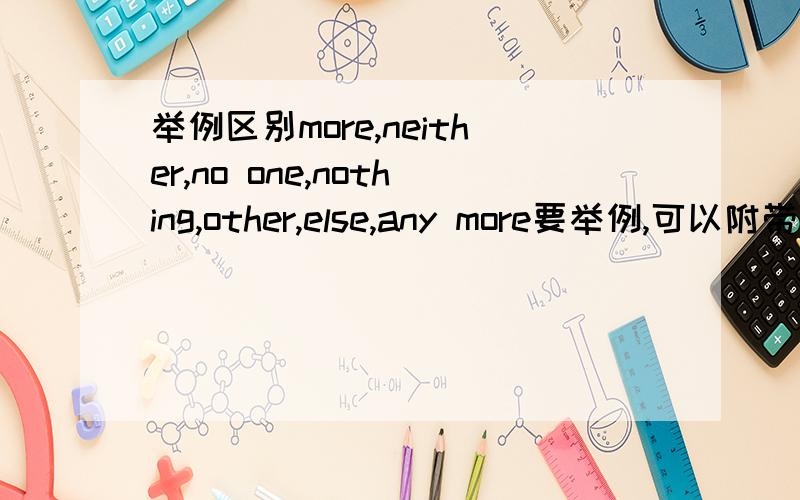举例区别more,neither,no one,nothing,other,else,any more要举例,可以附带简单说明
来源:学生作业帮助网 编辑:作业帮 时间:2024/11/27 22:35:50

举例区别more,neither,no one,nothing,other,else,any more要举例,可以附带简单说明
举例区别more,neither,no one,nothing,other,else,any more
要举例,可以附带简单说明
举例区别more,neither,no one,nothing,other,else,any more要举例,可以附带简单说明
1\ more:“更”“更多”
做形容词的时候,一般用来名词,如:
There are some sheep,and there are more dogs.
"这里有许多羊,同时有更多的狗.”
做副词的时候,一般用来修饰形容词或者副词的比较级,如:
Mary looks more beautiful than Lily.
“玛丽看起来比莉莉要漂亮些.”
2\neither:“既不……(也不)”,“不”
一般与nor组成“既不……也不……”句型,是both ……and ……的全否定形式,并且在做主语的时候,谓语动词要使用“就近原则”,如:
Both he and she like this book.
“他和她都很喜欢这本书.”
Neither he nor she likes this book.
“他和她都不喜欢这本书.”
也可以单独使用,如:
——He likes this book.
——So does she."他喜欢这本书,她也是."
——He does not like this book.
——Neither does she."他不喜欢这本书,她也是."
3、no one:“没有人”相当于nobody,指人,如:
There is no one listening to the radio now.
"现在没有一个人在听收音机."
4、nothing:“没有什么”,一般指物,如:
There is nothing serious."没什么大不了的."
5、other:“其他的,另外的,从前的”,一般用作形容词,用在名词之前,如:
He is taller than other boys."他比其他的男孩要高."
I went to school the other day."前几天我到学校去过."
6、else:"别的,其他的"
用作形容词的时候,一般用在名词或者代词之后,如:
Would you like anything else?
“还想再要些别的吗?”
用作副词的时候,一般与疑问代词how,what,which等连用,如:
Where else would you like to go besides San Francisco?
"除了旧金山你还要去什么地方?"
另外就是or else短语:
Be careful,or else you will make a mistake.
“小心,否则你会犯错的.”
7、any more:“再”,
一般用在疑问句或者否定句中,如:
He does not live here any more.
"他不再住在这里了."not ……any more
有时候用作比较级,如:
Are these books any more useful than those?
"这些书比那些书更有用么?"